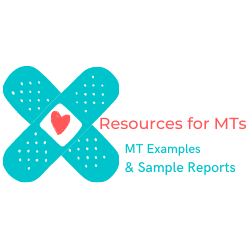DATE OF CONSULTATION: MM/DD/YYYY
REFERRING PHYSICIAN: John Doe, MD
REASON FOR CONSULTATION: Evaluation and treatment of carotid artery stenosis.
HISTORY OF PRESENT ILLNESS: The patient is a (XX)-year-old Hispanic male referred for evaluation of carotid artery stenosis. During routine workup, a stress test was performed as well as a sonogram of the carotids. The sonogram of the carotids showed a significant stenosis in the right internal carotid artery. With these results, an MRA was requested showing arteriosclerosis and narrowing of the proximal right internal carotid artery with a focal high-grade stenosis approximately 1 cm distal to the bifurcation, estimated approximately 90%. Normal appearance of the left internal carotid artery with bilateral normal vertebral arteries and basilar artery. The patient is complaining of intermittent dyspnea, no other symptoms. No symptoms of amaurosis fugax or focalized sensory or motor deficits.
PAST MEDICAL HISTORY: Positive for hypertension, hyperlipidemia, peptic ulcer disease, gastroesophageal reflux disease, coronary artery disease, and status post myocardial revascularization. There is no history of diabetes, stroke or cancer.
PAST SURGICAL HISTORY: Positive for coronary artery bypass graft x3, status post bilateral inguinal hernia repair, status post laparoscopic cholecystectomy, and status post PTCA to coronary arteries.
MEDICATIONS ON ADMISSION: Zocor, Toprol XL, Norvasc, aspirin, and hydrochlorothiazide.
FAMILY HISTORY: Positive for coronary artery disease.
SOCIAL HISTORY: The patient lives by himself and has one daughter. The patient smoked intermittently, but quit several years ago.
REVIEW OF SYSTEMS: The patient has had no weight loss or weight gain in the recent past. No fever in the recent past. The patient complained of fatigue and occasional dizziness. The patient wears glasses for reading. No history of pain, double vision, glaucoma or cataracts. History of ringing in ears. No history of vertigo, hoarseness or frequent nosebleed. No pain urinating, no burning. The patient describes prostatism with increased frequency and urination at nighttime. No hematuria. No history of shortness of breath, no coughing, no wheezing, no persistent cough, and no frequent infections. No abdominal pain. No nausea, no vomiting, no heartburn. No upper or lower GI bleeds. The patient complains of intermittent constipation. Positive for chest pain and palpitations. No abnormal bleeding or hypercoagulable state. The patient is complaining of stiffness and muscle pain in the upper and lower extremity. No seizures or memory loss. No CVAs. No loss of consciousness. No rashes or sores. No itching, no burning of the skin.
PHYSICAL EXAMINATION:
VITAL SIGNS: The patient is afebrile, pulse 66, respirations 18, and blood pressure 154/82.
GENERAL APPEARANCE: The patient is awake, alert, oriented, in no acute distress. Well nourished and well developed.
HEENT: Head is normocephalic and atraumatic. No sinus or mastoid tenderness. Pupils are equal and reactive to light and accommodation. Extraocular muscle movements are intact. The oropharynx is clear. Oral mucosa is pink and moist.
NECK: Supple and symmetrical. No jugular vein distention. No thyromegaly, no lymphadenopathy. The patient has a right carotid bruit.
CHEST: Symmetrical with a surgical scar from the previous bypass surgery.
LUNGS: Decreased breath sounds on both bases, but the lungs are clear. No wheezes, rales or crackles.
HEART: Shows a regular rate and rhythm. S1 and S2. No murmurs, rubs, or gallops.
ABDOMEN: Soft, nontender. Bowel sounds are present. No visceromegaly, no palpable masses, no detectable bruits, no guarding or peritoneal signs. Surgical scar from a previous procedure.
EXTREMITIES: No edema, cyanosis, clubbing or joint swelling. No calf pain.
VASCULAR: Peripheral pulses are present in all extremities with good capillary refill.
NEUROLOGICAL: No gross motor or sensory deficits. The patient is awake, alert, and oriented x3.
DIAGNOSTIC TESTS: MRA, as previously described in the history of present illness. EKG shows a normal sinus rhythm with left atrial enlargement. Anterolateral T-wave abnormalities.
LABORATORY TESTS: White blood count 5.6, hemoglobin 15.6, hematocrit 45.4, and platelets 154,000. PT 13.4, PTT 29.8. Sodium 140, potassium 3.5, chloride 98, CO2 of 26, glucose 92, BUN 16, and creatinine 1.1. Total protein 8.6, albumin 4.8, magnesium 1.8. Urinalysis within normal limits.
IMPRESSION:
1. Severe right internal carotid artery stenosis.
2. Arterial disease.
3. Status post coronary artery bypass graft surgery.
4. Hypertension.
5. Dyslipidemia.
6. Gastroesophageal reflux disease.
PLAN: With the previous information, the patient has an asymptomatic severe right carotid artery stenosis; its treatment option is carotid endarterectomy. Risks and possible complications were explained to the patient as well as treatment options. The patient agrees with the procedure and will proceed with a right carotid endarterectomy. We will do intraoperative EEG evaluation as well as a cerebral oximetry during the operative procedure. The patient agrees.
